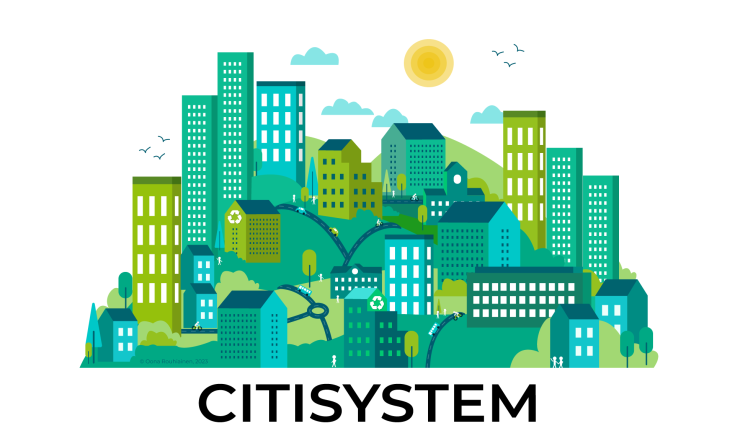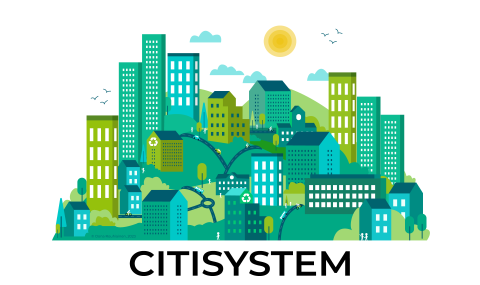Thematic Webinar 1 - summary
Biobased Circular Systems
Promoting circular bioeconomy and the circulation of materials, nutrients, and energy flows in the urban environment is at the heart of the CITISYSTEM – Supporting cities in sustainable biobased systemic change project. In order to boost the knowledge exchange among the project partners and stakeholders, and to inspire the biobased circular economy development and systemic change thinking, the project organizes thematic webinars. The first Challenges and Solutions for Biobased Circular Systems in Cities -webinar was organized in June 2023.
Circular Approach in Construction
Ιο Chatzivaryti, Mayor’s Advisor in EU projects, Municipality of Kavala, presented the circular economy case study of Kavala, from a public sector perspective. The case served as an inspiration for systemic thinking that could be adopted in other sectors. The municipality designed a vision and a roadmap for an integrated approach, reutilization of construction and demolition waste to close the loop, and its inclusion in green procurements in Greece. Capitalizing on the knowledge exchange and continual review and adjustment of planned actions were among the key enablers.
Biodiversity loss & Food Production
Ville Uusitalo, Associate professor at LUT, emphasized the important aspects of biobased circular systems in terms of biodiversity loss, including food production and consumption. Ambitious biodiversity targets have been set up by companies, but impact quantification of their actions is lacking. A research project BIODIFUL – Biodiversity Respectful Leadership looks at biodiversity assessment methodology. Link to BIODIFUL website
Among the key direct drivers for biodiversity loss are land use change, followed by resource exploitation and intensifying climate change. Food and beverages have a key role in global land use (46% of the habitable land for agriculture) and resource exploitation. (Ritchie & Roser 2019.) Therefore, food production has a great role (over 50%) in our consumption-based biodiversity footprint (Kurth at al. 2021). For instance, meat and cheese production are among the products with the highest biodiversity impact (60%). (Crenna et al. 2019, 383.)
Biorefineries
The PULINA project explores wastewater (WW) treatment plants through circular economy lenses, aiming to transform the WW plants into economically viable biorefineries. WW sludge can be utilized for biogas, bioethanol, and biodiesel production, PHA extraction, nutrients recovery (fertilizers, soil amendments), and as a source of other valuable components (VFA, metals, lignin, cellulose, CO2, etc.). The potentially present hazardous substances (heavy metals, microplastics, pathogens, drug residues, etc.), legislation, and low profitability are the main barriers to scaling up, noted Mari Eronen, a researcher at LAB.Link to PULINA website
The BIOSYKLI project promoted bio-based circular economy by developing low-carbon solutions and new sustainable businesses in Päijät-Häme. For instance, by recycling carbon from WW sludge for PHA production used in bioplastics, and thus turn bioplastics into carbon sinks.Link to BIOSYKLI website
Mikko Rahtola, RDI specialist in LAB, introduced the 5R Refinery project, which aims at efficient utilization and valorisation of side and waste streams from forestry and WW sludge to create new business opportunities, such as biofertilizers and hydroxy acids.Link to 5R Refinery website
The article was originally published on 20.9.2023 in the LAB Focus: https://blogit.lab.fi/labfocus/en/biobased-circular-systems/
References
Crenna, E., Sinkko, T., Sala, S. 2019. Biodiversity impacts due to food consumption in Europe. Journal of Cleaner Production. Vol. 227. 378-391. Cited 18 Sep 2023. Available at https://doi.org/10.1016/j.jclepro.2019.04.054
Kurth, T., Wübbels, G., Portafaix, A., Meyer zum Felde, A. & Zielcke, S. 2021. The Biodiversity Crisis Is a Business Crisis. Boston Consulting Group. Cited 18 Sep 2023. Available at https://www.bcg.com/publications/2021/biodiversity-loss-business-implications-responses
Ritchie, H. & Roser, M. 2019. Land Use. Our World In Data. Cited 18 Sep 2023. Available at https://ourworldindata.org/land-use#how-the-world-s-land-is-used-total-area-sizes-by-type-of-use-cover


